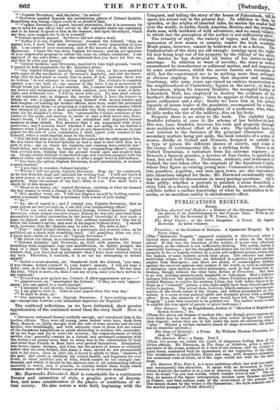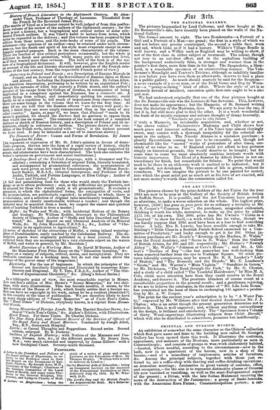PUBLICATIONS RECEIVED.
Boons.
Turkey, Ancient and Modern ; a History of the Ottoman Empire from the period of its Establishment to the Present Time. With an Ap- pendix. By the Reverend R. W. Fraser, M.A.
The Brie}' Career ; or the Jew's Daughter. A Novel. By Captain Horrocke. In three volumes.
.Firmilian ; or the Student of Badajoz. A Spasmodic Tragedy. By T. Percy Jones. [This "Spasmodic Tragedy " appeared originally in Blackwood, where it excited some attention. It has been considered a satire on the intent school. If this was the intention of the author, it is not very effectively developed, as the ridicule is not sufficiently striking. The action, indeed, is essentially burlesque ; but the thoughts and diction are too like what the boot purports to be—a tragedy written by a most self-sufficient person, rather after the fashion of some modern novels than plays. The extreme and almost motiveless crimes of Firmilian are defended in a preface by perverted ex- amples from Shakspere and there are plenty of commonplace diatribes against the received opinions and conduct of the world, as well as soliloquies or dialogues upon modern so-called philosophy, such as bad dramatists in- troduce, though without the close terse diction of Firmilian. But there is no fun, nothing spontaneously laughable or ridiculous. Had a ludicrous epilogue followed the penultimate scene, where Firmilian persuades his be- trothed Mariana to receive his mistress Lilian, but both ladies object to In- diana as a "coloured" person, a late light might have been thrown upon the author's purpose. The actual close, however, which contains a vigorous ani- mation of the whole action of the drama, and inflicts punishment on Fir- milieu, is a scene of real poetical spirit and dramatic power with a striking effect. Even the omission of this scene would have left the "Spasmodic Tragedy " a joke that required to be pointed out. The author wants or fails to exhibit the true spirit of parody or grave burlesque.] Five Dramas. By an Englishman, Author of " Sketches of English and Scotch Scenery, 8re. [These five pieces are dramas of modem life; and though grave matters and even death may be found in them, they seem rather designed for comedy than tragedy, unless they are to fall under the more all-embracing class of "play." Beyond a certain imitative knack of stage movement, the author has no dramatic aptitude.] The Siege of Silietria ; a Poem. By William Thomas Thornton, Au' thor of " Zohrab."
The Eastern War; a Poem. Part I. [These two poems are rather the result of temporary feeling than of the divine afflatus. Mr. Thornton, in The Siege of Silistria, gives a selected narrative of the event, prefaced by a view of the fortress and its vicinity lu quiet times, contrasted with its appearance at the beginning of the MeV. The versification is octosyllabic, fluent and easy, with frequent animation, but occasional want of finish, as if the topic would not wait for the labor limse. The Eastern War, Part I, is a more ambitious affair, but with less unity, and consequently less attraction. It opens with an invocation to Peace; whose domicile the author is at a loss to discover, doubting whether it men ever be found "in yon vast worlds, which wonder loves to tell." The au- thor, by means of the figure retrospection, touches upon RussianraisdeWc in Poland; and then notices some of the occurrences of the present war.; The stanza chosen by the writer is the Spenserian ; the style reminds one the martial passages of Childe Harold.] jliaterY 0 f "kends Literature in the Eighteenth Century. By Alex- ander Vinet, Professor of Theology at Lausanne. Translated from the French by the Reverend James Bryce. f merits of Vinet as a lecturer cannot be well. judged of from this posthu- mous volume of his review of the authors of the eighteenth century ; for the 1,00k is not a history, but a biographical and critical notice of some cele- brated French authors. It was Vinet's habit to lecture from notes, which notes he expanded in the delivery ; and this volume has been prepared by his editors from those notes, and the note-books of some of his pupils. The substance—the opinions of an author—may be retained under such circum- stances, but the finish and spirit of his style must evaporate except in some happily reported passag:es.'Such is the main characteristic of the volume. There are touches of nice eritieal portraiture occasionally, but the whole is deficient in finish and animation, while many parts are somewhat level, aa if they wanted more than revision. The bulk of the book is of the na- ture of a biographical dictionary. It will, however, give the English reader an account of the life and literary character and position of the French cele- brities of the last century, from the respectable French point of view.] Autocracy in Poland and Russia ; or a Description of Russian Misrule in
Poland, and an Account of the Surveillance of Russian Spies at Home
and Abroad. Including the Experience of an Exile. By Julian Allen. [An American importation, professing to be written by an expatriated Pole ; though the surname of Allen has scarcely a Polish sound, and the author's account of his escape from the College of Grodna, in consequence of being implicated in a conspiracy against the Russians, has a romantic air. A youth flying from college, and immediately quitting his country, could hardly be in a condition to tell much of importance from observation; but there are some things in the volume that we learn for the first time. At nage 66 we are told that the Russian officers " are always well paid ; in- d, I think they are more amply remunerated than in the army of any other country." Again, at page 67, we learn that Finland " needs to be securely guarded, for should the Tartars find no garrison to oppose them they would rise en masse." The contents of the book consist of a compiled account or sketch of Russian history, and a description of Poland and its in- habitants, chiefly in reference to serfdom. The picture drawn of the con- dition of the Polish serfs, interlarded with " tales," is the darkest account we have read. It may be intended as a set-off to American slavery.] The Nemesis of Power : Causes and Forms of Revolution. By James Augustus St. John.
(An argument or expression of Mr. St. John's opinion in favour of demo- cratic progress, thrown into the form of a rapid review of history, chiefly modern, and of the crimes by which the despotic rule of kings supported by priests and aristocracies have been characterized. The book also contains the writer's opinions on government and social institutions.]
A Reading-Book of the Turkish Language, with a Grammar and Vo- cabulary; containing a Selection of original Tales, literally translated, and accompanied by grammatical references : the pronunciation of each word given as now used in Constantinople. By William Burck- hardt Barker, M.R.A.S., Oriental Interpreter, and Professor of the Arabic, Turkish, and Persian Languages, at Eton College ; Author of "Lures and Penates " &c. (A full and painstaking gook for those who would study the Turkish lan- guage so as to attain proficiency ; and, as the difficulties are progressive, not ill adapted for those who would study it all grammatically. It contains a grammar, in which the alphabetical forms, the conjugation of verbs, and the pronunciation are particularly: regarded ; in addition to which, there is a vocabulary, and selection of original tales interlinearly translated. The pronunciation is clearly unattainable without a teacher; and though the alphabet may be acquired from a book, we suspect the easiest and quickest mode of learning Turkish is from a master.] Moira : its Walks and Wells ; with incidental Notices of its Botany and Geology. By William Keddie, Secretary to the Philosophical Society of Glasgow, Author of " Stara and Iona Described and Illus- trated,', &c. And Report on and Chemical Analysis of its Mineral Wells, &c. By John Macadam, F.R.S.S.A., &c., Author of "Che- mistry in its application to Agriculture," &c.
[A series of sketches of the attractions of Moffat, a rising inland watering- place of Dumfriesshire, easily reached by the Caledonian Railway. The de- scriptivepapers were originally published in a local journal. In their collected form they are accompanied by a very elaborate report on the waters of Moffat, and water in general, by Mr. Macadam.]
Mental Exercises of a Working Man. By David MEurnie, Author of the Manchester First Prize Essay on the "Education Question," &c. [Papers on a variety of subjects, critical, moral, and metaphysical. They are creditable exercises for a working man, but do not rise much above the average of the graver essay of the magazines.] Electricity. For the use of beginners. In which the principles of the Science are familiarly Explained and Illustrated by numerous Expe- riments and Diagrams. By T. Tate, F.R.A.S., Author of "The Out- lines of Experimental Chemistry," &cc. (Gleig's School Series.) In a bibliopolie point of view the most remarkable reprint is Messrs. Low and son's edition of Mrs. Stowe's " Sunny Memories," for two shil- lings, with sixty illustrations. This has become needful, it seems, by the late decision of the House of Lords, which finally settles that a foreign au- thor can have no copyright in his work, unless he be a residentidoiniciled?] in this country at the time of publication. We are therefore likely to have as many cheapp editions of "Sunny Memories" as of Uncle Tom's Cabin, The " Hard Times" of Dickens, everybody knows, is a reprint from House.? bold Words.
Sunny Memories of Foreign Lands. By Mrs. Harriet Beecher Stowe, Au- thor of " Thiele Tom's Cabin," &c. Author's Edition, with Illustrations. Hard Times. For these Times. By Charles Dickens. The New Nary List, and General Record of the Services of Officers of the Royal Navy and Royal Marines. Conducted by Joseph Allen, Esq., R.N., Greenwich Hospital.
Egeria ; or Casual Thoughts and Suggestions. Second series. Second edition, enlarged. By B. Dockray.
Outlines of English History; with Notices of the Manners and Cus- toms, Dresses, Arts, &c., of the different periods. By Henry Ince, M.A.. very much extended and improved, by James G ilbert: with a new Geological Chart. Seventy-ninth thousand.
PAMPHLETS.
d Letter to the President and Fellows of sixth of a series of plain and simple Royal College of Physicians, in re- Lectures on the Education of Man. By
an to the Evidence cited in their Thomas Flopley. (Written with solely
late Report on the Treatment of Eg- to delivery in London.) demic Cholera. By Joseph Ayre, 2d. .t On the Material Aids of Education being Licentiate of the College; Chairman of ,tho Sanitary Committee of the Local an Inaugural Lecture on the occasion
nosed of Health and any years Ph- of the Educational Exhibition of 1854,
an to the GeneralmIlospital, Disy- delivered July 10, 1854. By W. Whe- Penuary. and Lying-in Charity of Hull. well, D.D. 77se Lord's-Day and the British People. 4 Lecture on .Deapfrafion ; being the An Argument for Both. By a Believer.



























 Previous page
Previous page